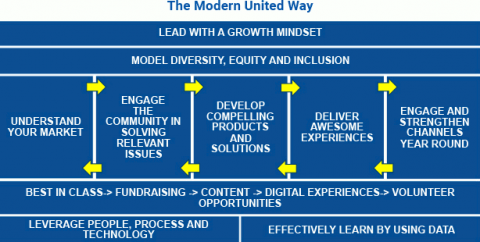
Foreward
Introduction
United Way is a global nonprofit organization that seeks to improve lives for every individual in every community. United Ways work to accomplish this by engaging community residents, partners, the business community, local government and other key constituencies to ensure that all community members have access to a high-quality education, access to jobs with good wages, and the ability to live a healthy life. The business model is how United Ways raise revenue to deliver impact in the communities we serve. At the heart of the business model is an understanding that the core work of United Ways is to deliver positive community change and that the donor is the customer. United Ways that can successfully raise revenue and deliver community impact are those that are (1) donor-centered (i.e. know who their existing and potential donors are, the issues and causes their donors care about, and what motivates them to give); (2) know how to best reach existing and potential donors and provide them meaningful opportunities to engage in our work; (3) and have a clearly defined community impact agenda. The community impact agenda should consist primarily of a set of goals, strategies, and priorities that were developed by engaging community residents, investors, and partners. The agenda should continuously be updated to reflect the evolving needs and challenges of the community and framed as an opportunity for donors to invest.
In our recent history and transition to community impact, United Way’s work has focused on providing equitable opportunities for all. We have stressed deepening community engagement that is representative and inclusive of all residents as instrumental in ensuring that our work in education, economic mobility, and health is focused on shared community priorities. Although United Way’s work in education, income, and health has often implicitly addressed inequity, primarily by focusing resources on historically marginalized populations, creating more equitable communities was not an explicit strategic goal. Within United Way, our institutional focus has traditionally centered on increasing diversity and inclusive practices rather than creating more equitable organizations.
The present-day reality in the United States is that historical, persistent patterns of structural and institutional discrimination and implicit bias based on race/ethnicity, gender, and other identities have created lasting inequities and pose ongoing barriers to enabling all to live the “good life.” United Way recognizes that improving the lives of everyone in the communities we serve means we must explicitly focus on removing these barriers for those most harmed by them. This includes addressing systems, policies, practices, belief systems, and attitudes that have often served to privilege some and disenfranchise others. It is only through an intentional focus on removing these barriers that we can aspire to create the conditions that allow everyone the opportunity to thrive.
that United Ways need to engage in our equity work.

“The present day reality in the United States is that historical, persistent patterns of structural and institutional discrimination and implicit bias based on race/ethnicity, gender and other identities have created lasting inequities and pose ongoing barrier to enabling all to live the “good life.”
The Modern United Way represents how our network must evolve in response to fundamental shifts related to technology, globalization, the workplace, and increasing racial and ethnic diversity in the U.S. The Modern United Way articulates the set of critical organizational practices and mindsets necessary to ensure United Ways maintain their relevance, deliver community impact, and generate revenue. Modeling diversity, equity and inclusion is a priority, overarching critical success factor in the Modern United Way. United Way recognizes that it is important to embody the principle of equity in our internal organizational practices. United Way can effectively deliver on our mission only by intentionally advancing equity inside our organizations and out in the community by creating an environment where all people feel supported, listened to, and empowered.
Equity is also an underlying principle in all of the other critical success factors included in the Modern United Way. This emphasis reflects the understanding that a focus on equity in all aspects of our work is essential to the continued relevance of United Way as a partner of choice to address the most critical pressing issues within and across communities in the United States. Focusing on equity, by intentionally addressing racial and other disparities will ensure that United Ways can more effectively fight for the health, education and economic mobility of every person in every community. In practice, this means a Modern United Way engages community residents, particularly those who have been historically marginalized, to identify and understand persistent, systemic inequities and to create impact solutions that help advance inclusive growth and opportunity for all.
Equity is also an underlying principle in all of the other critical success factors included in the Modern United Way. This emphasis reflects the understanding that a focus on equity in all aspects of our work is essential to the continued relevance of United Way as a partner of choice to address the most critical pressing issues within and across communities in the United States.



